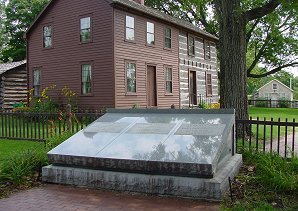
The reaction now began. . . .
It was impossible that the matter should be allowed to pass entirely unnoticed by the law. Besides, Governor Ford, who considered the murder a personal disrespect to himself, was really anxious to bring the perpetrators to justice. Bills of indictment were found at the October [1844] term of court against Levi Williams, Mark Aldrich, Jacob C. Davis, William N. Grover, Thomas C. Sharp, John Willis, William Voorhees, William Gallagher, and one Allen. They were based on the testimony of two idle youths, named Brackenbury and Daniels, who had accompanied the expedition from Warsaw to Carthage on the 27th of June, and had seen the whole affair. Having a natural disinclination to work, they lived as long as they could by exploiting this rare experience. Their evidence being worse than useless in Warsaw, they went to Nauvoo, professed Mormonism, and had their board paid by the faithful, to secure their attendance at the trial. Brackenbury formed an alliance with a sign-painter, who executed in the highest style of Nauvoo art a panorama of the prophet's Death and Ascension, which they exhibited to the great edification of the Mormons and to such profit that the artist soon died of the trembling madness, and Brackenbury fell heir to the canvas and the fees. Daniels collaborated with a scribbler named Littlefield on a most remarkable pamphlet on the subject, stuffed full of miracles, and inventions more stupid than the truth.
Murray McConnell, who appeared in behalf of the governor to prosecute (and who was himself mysteriously assassinated twenty-four years later-as if a taint of blood were on all connected with this drama), made an arrangement with the defendants' counsel, by which the defendants agreed to appear voluntarily at the next May [1845] term, the State not being ready with its evidence. But toward the end of November, the vote of Davis becoming inconvenient to the leaders of the Seat, this convention was violated, and orders made for writs instanter against Davis and the rest. They were treated with contempt. Davis kept his seat in the Senate, and when the sheriff came to Warsaw he was received with that jocose discourtesy which so often in the West indicated a most sinister state of public feeling. He could find no trace of the men he was looking for. Nobody had seen or heard of them for weeks. In every shop he entered, he saw a loaded rifle, or a man oiling a gun-lock or moulding bullets. In the morning, when he mounted his horse to ride away, he found his mane and tail shaved bare as the head of a dervish. Hurrying out of the hostile neighborhood, he passed a crowd of grinning loungers.
"My horse was in bad company last night," he said, with a wretched attempt at good-natured indifference.
"Most generally is, I reckon," was the unfeeling retort; and the chief executive officer of the county left the mutinous town to itself.
The next May, all the defendants appeared, according to agreement, to stand their trial. They began by filing their affidavit that the county commissioners who selected the array of jurors for the week were prejudiced against them; that the sheriff and his deputies were unfitted by prejudice to select the talesman that might be required. They therefore entered a motion to quash the array of jurors, to set aside the sheriff and his deputies, and to appoint elisors to select a jury for the case. After argument, this was done. The elisors presented ninety-six men, before twelve were found ignorant enough and indifferent enough to act as jurors.
A large number of witnesses were examined, but nothing was elicited against the accused from any except Brackenbury, Daniels, and a girl named Eliza Jane Graham. The two first had been lying so constantly for some months professionally, the one in his pamphlet, the other in his rare-show, that they had utterly forgotten where they started from, and so embroidered their original facts with more recent fictions, that their evidence went for nothing. Besides, the showman Brackenbury thought that the pamphleteer Daniels had received more attention than himself from the polite world of Nauvoo, and was consequently stung by jealousy to contradict in his evidence all that Daniels had sworn to. The evidence of Miss Graham, delivered with all the impetuosity of her sex, was all that could be desired-and more too. She had assisted in feeding the hungry mob at the Warsaw House as they came straggling in from Carthage, and she should remember where every man sat, and what he said, and how he said it. Unfortunately, she remembered too much. No one accused her of willful perjury. But her nervous and sensitive character had been powerfully impressed by the influence of Smith, and, brooding constantly upon his death, she came at last to regard her own fancies and suspicions as positive occurrences. A few alibis so discredited her evidence, that it was held to prove nothing more than her own honest and half insane zeal.
The case was closed. There was not a man on the jury, in the court, in the county, that did not know the defendants had done the murder. But it was not proven, and the verdict NOT GUILTY was right in law.
And you cannot find in this generation an original inhabitant of Hancock County who will not stoutly sustain that verdict.